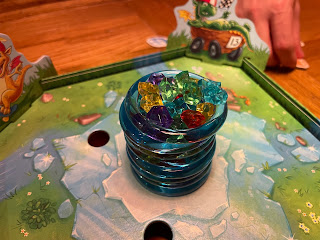Saturday night, and Tin Goose sat on the table awaiting the attentions of Andrew and Ian: the history of American's airways playing out over several decades, as players expand their networks, build their fleets and rid their reputation of the bureaucracy of Regional Management.
Tin Goose's interesting aspect is that as Fleets become available, everyone bids on them. As the end goal is to be the richest polluting airborne industrialist, the bids both tempt and appall you: the last thing you want to be in the game is cash-poor, as someone - probably Ian - will play an Event card that costs you money you don't have.
Over seven rounds everyone takes a single turn. This consists of playing a card, either to auction off a fleet (active player bids last) or prompt the event on it. Then you've three actions to spend: pushing up your income, expanding your network, taking Labor chips (in case of a shitty event) or serving the financially alluring (but action-heavy: it costs two actions) international destinations:
Everyone begins with five shitty cards that hamper your airline: Regional Management, Rural Stops, Hazards and so on. If you add a fleet to your airline (as opposed to upgrading an existing fleet) you get to shed one of these cards and get two new planes. But upgrading is also tempting, because improving your planes gets your hazards and oil consumption down: events won't hit you quite as badly.
The planes come with hazards and oil consumption, as well as tiny descriptions: "This fleet is prone to metal fatigue" Ian announced at the start of an auction, perhaps trying to keep prices low. "This one's a bit crashy" said Andrew. Timing of events is everything, and Ian did it well, forcing me to take a bond at the worst moment. I'd managed to establish a lot of overseas connections, but having two bonds was not good news. Ian only had one, and Andrew none at all. In the end, his shrewd frugality made the difference:
Ian $283
Sam $236
I think we all liked Tin Goose. Outside of a modicum income-track management, it's an accessible set of rules and a deceptively interactive and screwy game.
It was still early so although Andrew had an early start he suggested Raj, and we played three rounds with winner's reward. Ian won the first convincingly, as Andrew's enormous set of tiles gave him the sum total of one point:
It ended with some measure of Goosian revenge:
Ian 46
Andrew 12










Tsuro was short but also epic, if that's possible. Between us we used every tile, finishing with only one square left unused. It was a thing of beauty and I'm not sure we could do that if we tried.
ReplyDelete